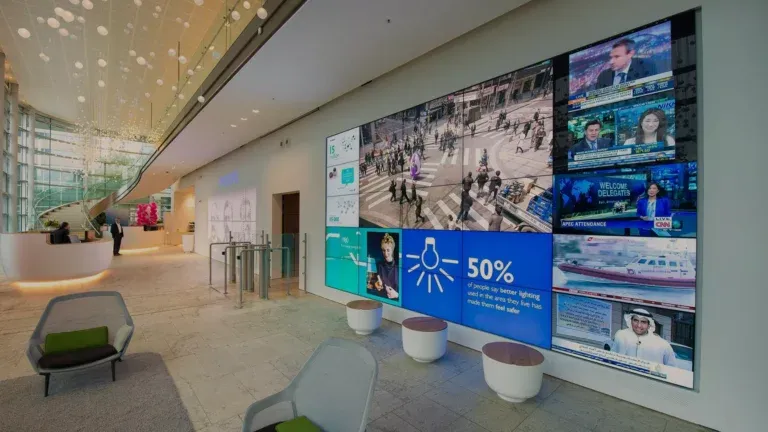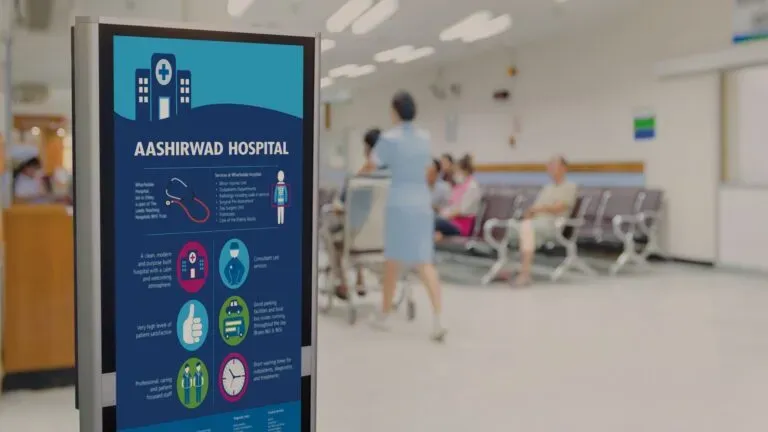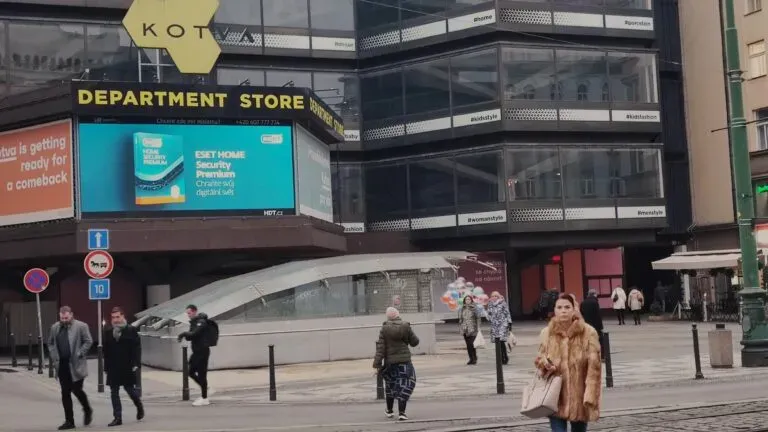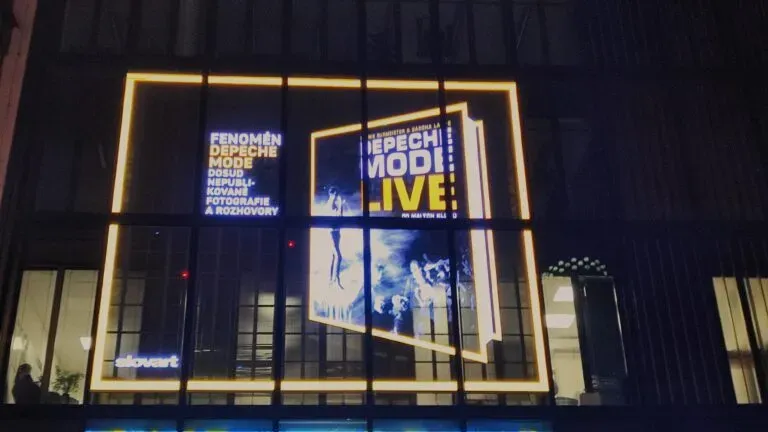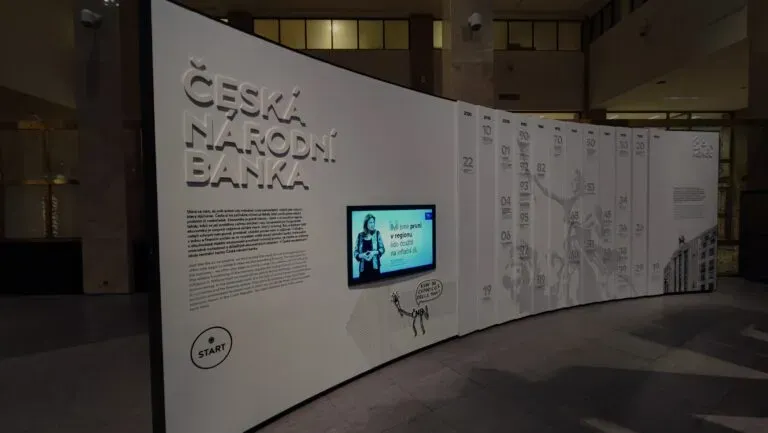Top 10 trends in outdoor advertising for 2025
The outdoor advertising (DOOH) format is the undisputed leader among offline communication tools.
In the rapidly changing urban environment and amid growing competition in the advertising industry, outdoor advertising remains one of the most effective ways to capture consumer attention. In 2025, Ukraine will implement new technological solutions that will help businesses stand out among competitors and create lasting impressions on their audience during advertising campaigns. This article explores the key directions in outdoor advertising development and how they can benefit your brand.
Outdoor advertising trends: Next-generation digital screens (DOOH)
Digital Out-of-Home advertising (DOOH) is evolving rapidly. Cutting-edge screens with high resolution and vibrant colors, powered by LED technologies, enable the creation of dynamic and memorable advertisements. These digital screens are increasingly being installed on busy streets, at train stations, and in shopping malls. DOOH allows brands to deliver vivid visual messages, grabbing attention even in the bustle of urban movement.
For example, DOOH can be utilized at major intersections, where advertisements are synchronized with the time of day, displaying calmer tones in the evening and vibrant daytime scenes in the morning.
Interactive outdoor advertising
One of the key trends in outdoor advertising for 2024–2025 is the focus on audience interaction. Interactive advertising surfaces that respond to movement, touch, or even temperature are becoming increasingly popular. Examples include touch-sensitive panels at bus stops, interactive screens in subway systems, or on city streets.
This approach enables businesses to establish closer connections with potential clients and gather feedback. For instance, interactive panels in subway stations can invite users to participate in a survey or play a mini-game, immersing consumers in the brand interaction process.
With the development of pDOOH (Programmatic Digital Out-of-Home), digital solutions are becoming even more flexible. Thanks to video wall software and modern players for digital signage, content can be quickly adjusted based on location, time, or audience, ensuring maximum advertising campaign efficiency.
Hyperlocal targeting
Modern technologies allow for highly precise audience location tracking. Hyperlocal targeting in advertising enables brands to display ads relevant to a specific street, neighborhood, or even a particular spot in the city. This is especially useful for small and medium-sized businesses seeking to attract local residents or people working nearby.
For example, a café or restaurant can broadcast special offers on digital signs within a few blocks of the establishment. Using digital signage players ensures dynamic content that effectively captures the attention of office workers or shoppers in nearby malls.
Augmented reality (AR) technologies
Augmented reality (AR) opens new opportunities for outdoor advertising by creating captivating visual effects and immersive experiences through smartphones. For instance, viewers can use a mobile app to see a 3D object or character “step out” of a traditional billboard.
In Kyiv, billboards with AR elements have already appeared, allowing viewers to see characters extending beyond the billboard and directly addressing them “from the screen.” By using DOOH (Digital Out-Of-Home) software, AR can be integrated with video advertising to create unique experiences.
Using artificial intelligence to analyze the audience
Artificial intelligence (AI) in advertising helps not only in creating content but also in analyzing audience data. In 2024–2025, advertisers are increasingly using AI to adapt content in real-time, considering demographics, interests, and the behavior of passersby.
With AI, digital advertising signs can adjust content based on viewers’ age or mood, such as modifying language or visual elements. This personalized approach makes advertising more effective and engaging.
Sustainable materials and eco-friendly products
Sustainability and eco-friendliness have become key components of outdoor advertising trends in recent years. Brands are increasingly using eco-friendly materials and technologies that minimize environmental impact. These may include recycled materials, energy-efficient LED screens, and solar panels.
Such an approach supports the growing culture of eco-consciousness. For instance, companies that advertise on eco-banners made from recycled plastic receive positive feedback from their audience, especially among younger generations concerned about the environment. Using software for LED screens makes eco-advertising even more technologically advanced.
Dynamic content change in real-time
Modern technologies allow advertising to quickly adapt to changing conditions in real-time. For example, advertising screens can display different content in the morning and evening or even adjust advertising to weather conditions.
A successful example is the broadcasting of content on DOOH networks depending on the temperature and time of day: advertising warm clothing in cold weather and beach accessories on hot days. Such flexibility ensures greater effectiveness and audience engagement.
Outdoor advertising trends: Synergy with social networks
In 2024–2025, outdoor advertising is actively integrating with digital channels, especially social networks. Advertising campaigns encourage people to perform actions on social networks, take photos near advertising structures, or share content with specific hashtags.
Many brands are already successfully using such strategies by placing QR codes on LED screens that lead to the brand’s social networks or to special promo pages. Thanks to this integration, DOOH networks become a tool that combines offline and online communication, enhancing audience engagement and transferring it to the digital environment.
Minimalism and visual simplicity
In conditions of information noise, advertising trends show the growing popularity of minimalism and clean designs. Simple, concise messages attract attention faster and are easier for the audience to perceive.
Many companies use this approach, focusing on graphics and minimizing the amount of text. Thanks to DOOH Display Solutions, the minimalist approach becomes even more effective, as design simplicity blends well with modern video advertising technologies.
Creative approach and unconventional formats
Outdoor advertising is increasingly going beyond usual billboards, using creative solutions and unusual formats. Companies experiment with 3D banners, installations, and lighting effects that literally “stand out” against the urban landscape.
An example can be 3D effects that “extend” beyond the standard banner, creating a sense of volume. Thanks to centralized video management systems, such effects can be easily adapted to specific locations, making them ideal for large city streets, especially in the evening.
How can businesses stand out using outdoor advertising trends?
Outdoor advertising continues to evolve, and the latest trends offer companies unique opportunities to distinguish themselves from competitors. DOOH advertising, which leverages interactivity, hyperlocal targeting, and advanced technologies like artificial intelligence or augmented reality, makes brands more visible and memorable.
To stay on trend, businesses should actively adopt innovative solutions. For instance, centralized video management systems help efficiently control content across various platforms. With the right format and technologies, advertising can become not only successful but also tailored to the specifics of the urban environment.
Advision — Content Management System for remote management and media planning of video and audio content broadcast. We help offline businesses and advertising companies automate workflows and implement reliable Digital Signage infrastructure using our own software and hardware solutions.
Contact us and we will help you implement the most modern technologies to solve your problems!
Share the news

